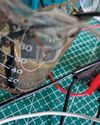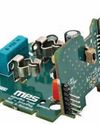"To Grow To THE NEXT LEVEL, We Must Build CRITICAL IPS"
Electronics For You
|March 2025
India's semiconductor ambitions hinge on fostering domestic demand for indigenous designs. But who will pave the way? The success of fabless giants like Qualcomm and Nvidia offers a blueprint. EFY's Yashasvini Razdan spoke to Sridhar Kaip of Semiconductor Fabless Accelerator Lab (SFAL) on what it takes to reach that level.
-

With your experience working with fabless startups, how do you evaluate India's current position in the global semiconductor ecosystem?
A useful way to understand India's position is through a pyramid model. At the top are mature markets, such as the US, Europe, and Japan, supporting approximately 2000 companies in the fabless semiconductor space. Below them are ecosystems such as Israel and Taiwan, with around 1000 companies. India, however, currently has fewer than 150 startups in this domain.
Over the past five to six years, India's semiconductor ecosystem has shown promising progress, but it is still in its early stages. Karnataka, especially Bengaluru, holds a unique advantage due to its concentration of captive centres, multinational companies, and abundant semiconductor talent. However, in terms of homegrown products and intellectual property (IP), we remain at an early stage.
What steps are needed to reach the next level of growth in this domain?
To achieve the next level, we must build critical IPs. This is a key focus area for SFAL. Some initiatives will involve leveraging existing resources, while others will require strategic development and expansion of core competencies.
The government of India has already announced initiatives to support this effort, and several startups are stepping forward to contribute. Belgium's journey 40 years ago provides valuable inspiration. Despite having no significant presence in electronics or semiconductors, Belgium initiated government-backed programmes to support the ecosystem. Today, it generates approximately $2 billion in revenue from a self-sustaining semiconductor industry.
What challenges do fabless startups in India face?
Denne historien er fra March 2025-utgaven av Electronics For You.
Abonner på Magzter GOLD for å få tilgang til tusenvis av kuraterte premiumhistorier og over 9000 magasiner og aviser.
Allerede abonnent? Logg på
FLERE HISTORIER FRA Electronics For You

Electronics For You
Tech Majors Are Racing TOWARDS NET-ZERO - What About You?
Apple, Microsoft, Amazon, Google, Infosys, Wipro—global and Indian firms are heading closer to achieving net-zero emissions, a mandate to combat climate change. Here is what you need to know to start your journey...
12 mins
December 2025

Electronics For You
Miniature IoT WATER TDS And LEVEL MONITOR Cum CONTROLLER
For setups that rely on stored water, clear awareness of tank level and water quality is essential.
3 mins
December 2025

Electronics For You
The Impact Of GENERATIVE AI On The Future Of AUTOMOTIVE AND EVs
Autonomous vehicles, connected ecosystems, and smart factories are only the beginning. Generative Al is pushing the auto industry beyond predictions into a bold era of creativity-from EV design to real-time diagnostics and showroom automation. Here is how GenAl is reshaping innovation across the automotive value chain.
8 mins
December 2025

Electronics For You
How AI Tools Are Making SOFTWARE DEVELOPMENT BETTER
AI is reshaping how we code, debug, and collaborate. From Copilot to automation, it is changing software development in ways worth exploring.
3 mins
December 2025
Electronics For You
How AI Tools Are Making SOFTWARE DEVELOPMENT BETTER
AI is reshaping how we code, debug, and collaborate. From Copilot to automation, it is changing software development in ways worth exploring.
3 mins
December 2025

Electronics For You
5 Interesting Reference Designs FOR SMART HOMES
Smart home devices are transforming the way people interact with their appliances. They make homes more convenient, secure, and energy-efficient. From smart plugs and energy monitors to smart locks and thermostats, reference designs help design engineers create connected products that are easy to use, consume less power, and are reliable. These designs allow you to control devices remotely, track energy use, extend battery life, and automate routines. They provide practical solutions for upgrading homes and small commercial spaces without major modifications.
3 mins
December 2025

Electronics For You
Fancy USB LED VASE
This USB LED vase is a simple yet elegant device that fuses art with electronics to create a decorative lighting display. Powered directly from a standard USB port, it uses readily available components such as MOSFETs, resistors, capacitors, and LEDs to produce a striking, dynamic sequence of lights.
3 mins
December 2025

Electronics For You
"WHAT OTHERS SELL IN FOUR BOXES WE BUILT IN ONE"
Years of custom field work are shaping a product line with its own cloud, its own hardware, and a market that is now beginning to recognise its value.
8 mins
December 2025

Electronics For You
BUILD LARGE LANGUAGE MODELS
Large language models are machine learning models designed for a range of language-related tasks such as text generation and translation. Here’s how open source software can help you build your own large language model.
6 mins
December 2025

Electronics For You
Rare Earth Or Rare Ingenuity? India Remains Between The Two
With China firmly controlling rare earth exports, India confronts a critical moment in its technological trajectory.
8 mins
December 2025
Listen
Translate
Change font size

